By Father Anthony Quyet
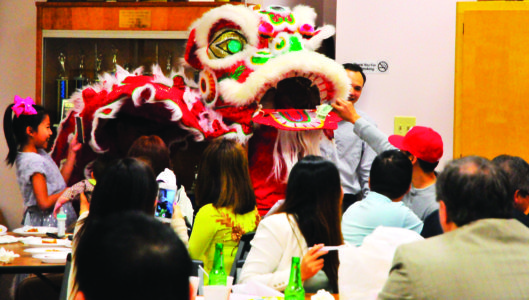
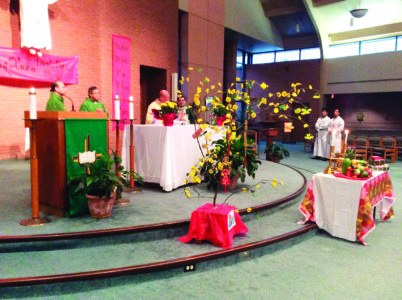
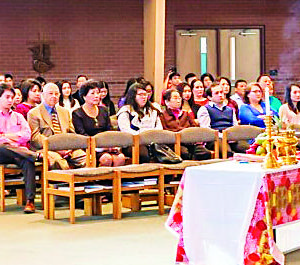
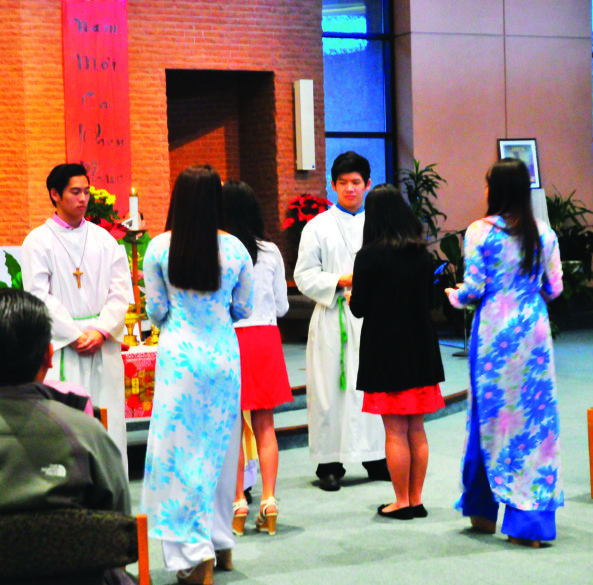
JACKSON – As we have done every year for the last 30 years, the Vietnamese Catholic Community in Jackson came together at St. Therese Parish to celebrate their New Year – called Tet – on Sunday, January 22. Tet is the first moment of the New Year, and its celebration of this Year of the rooster is made more special for several reasons.
We had the special honor this year of including four Vietnamese priests to the celebration: Fathers Peter Phong Nguyen, SVD, Chien Dinh, SVD, Joseph Le and myself.
Tet is the most sacred time and most celebrated holiday for the Vietnamese people. It’s the time set aside to make peace, to reconcile with self, God and others, and to make new resolutions aiming for a better year.
Tet is a combination of Thanksgiving, Christmas, New Year and Memorial Day celebrated here in the United States. Tet is also everyone’s birthday. So on the New Year’s Day, the first greetings are “Chuc Mung Nam Moi!” (Happy New Year) and “Chuc Tuoi Moi!” (Happy Birthday). The blessings of the New Year are expressed through the exchange of best wishes and gifts, especially “Lucky Money” (crisp new money bills in red envelopes).
This is the year of the Rooster. The cycle of animals repeats every 12 years. If we look at life span as 100 years the earliest year of the rooster for most people is 1921. That makes you 96. It
comes back every twelve years. So the next one is 1933, and you are 84; then 1945, you are 72; then 1957, you are 60; then 1969, you are 48; then 1981, you are 36; then 1993, you are 24; then 2005, you are 12.
If you were born in the year of the Rooster, you are observant, hardworking, resourceful, courageous and talented. Rooster people are very confident in themselves, love to talk and like to be the center of attention. They are surrounded by others, whether at a party or just a social gathering.
The rooster has a special place in the Scriptures which have 13 references. Ten of them are related to St. Peter and his triple denial of Jesus. The crow of the Rooster reminds him of the words of Jesus through which he recognized his sins and received not only forgiveness but his mission to continue Jesus’ ministry.
The spirit of Tet celebration is expressed in the way the Vietnamese talk about the holiday. They do not usually say “celebrate,” instead they use the phrase, “eat Tet” in these expressions and their likes, “Do you eat Tet with your family?” or “Where do you eat Tet?” Of course “eat” here means much more than just sharing the food. It means to be with each other to share food, fellowship, support and concerns.
Archbishop Fulton Sheen once asked a missionary who had just returned from one of the islands in the Pacific Ocean what the people whom he served would consider as the greatest virtue. The priest told the archbishop that, in order to help him understand more fully what the people there considered as the greatest virtue, he would tell him what they considered as the worst sin. “To them,” the priest continued, “it is to eat alone.” That’s why a person might go a day without food, until he or she could find someone with whom to share the meal.
Eating in that sense underlines Tet celebration. The customs and traditions during Tet reflect the harmonious bond with heaven, earth and people. It is the time to give thanks to God for his blessings, for the beautiful seasons and their harmonious cycles and for the nurturing fruit of the earth.
Most importantly, Tet is the time to renew and strengthen human relationship. Tet is a big family reunion. Family here is an extended family that includes not only family members but also relatives, neighbors, friends, benefactors and community. Out of this big family reunion everyone offers and receives the three best wishes: happiness, prosperity and longevity. 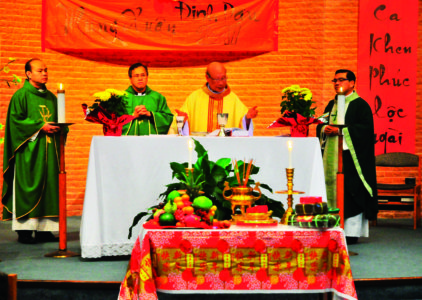
(Father Anthony Quyet is the rector of the Cathedral of St. Peter the Apostle.)
Monthly Archives: February 2017
Sick, suffering, our everyday heroes
Guest Column
By Sister Constance Veit, lsp
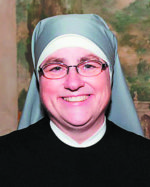 Over Christmas, two of my family members were talking about a mutual friend who, though chronically ill, routinely does heroic acts of kindness for others. Though they get exasperated with her when she overextends herself, they realize that caring for others is what makes life meaningful. I thanked God that these women are kind enough to support their friend through both good times and bad, helping her to live a full life.
Over Christmas, two of my family members were talking about a mutual friend who, though chronically ill, routinely does heroic acts of kindness for others. Though they get exasperated with her when she overextends herself, they realize that caring for others is what makes life meaningful. I thanked God that these women are kind enough to support their friend through both good times and bad, helping her to live a full life.
This incident came to mind as I read Pope Francis’ message for the World Day of the Sick, in which he reflects on St. Bernadette’s relationship to the Blessed Virgin Mary. Our Lady spoke to Bernadette “as one person to another,” he says, treating her with great respect, even though she was poor and sickly.
“This reminds us that every person is, and always remains, a human being, and is to be treated as such. The sick and those who are disabled, even severely, have their own inalienable dignity and mission in life.”
In light of the expanding legalization of assisted suicide, Pope Francis’ insights are invaluable. Studies have shown that the majority of people who support assisted suicide do so because they fear the loss of personal autonomy and dignity in their final days. Suffering, they say, is meaningless and should have no place in the human experience. It seems that the thought of having to go on living when faced with serious disability or illness is becoming unacceptable in our post-Christian society.
What I find most tragic in this exaltation of independence and personal choice is that this attitude denies the beautiful reality that we are made for community. Created in the image and likeness of God, who is a Trinity of Persons, we are inherently relational, not autonomous.
Mutual dependence, rather than independence, is the true Gospel value, and so we should not be ashamed when we need the assistance of others. Our weakness or infirmity can be a graced opportunity for those who help us, as well as for ourselves, for as Saint John Paul II so often repeated, we can only find fulfillment through the sincere gift of self to others.
This is why Pope Francis is asking us to honor the sick by helping them to share their gifts and abilities. “Let us ask Mary Immaculate for the grace always to relate to the sick as persons who certainly need assistance,” he writes, “but who have a gift of their own to share with others.”
St. Bernadette turned her frailty into strength by serving the sick and offering her life for the salvation of humanity. The fact that Mary asked her to pray for sinners, the pope writes, “reminds us that the infirm and the suffering desire not only to be healed, but also to live a truly Christian life.”
Social media has allowed me to become acquainted with numerous heroes who go on giving in the midst of tremendous suffering. If you are looking for inspiration just google Zach Sobiech or Lauren Hill, young adults who made a difference in the world while dying of cancer; J.J. Hanson, president of the Patients Rights Action League, who triumphed over a brain tumor; or O.J. Brigance, a former professional football player who inspires thousands though he is completely paralyzed by Lou Gehrig’s disease.
I am sure that you have unsung heroes in your midst in the person of sick, disabled or elderly persons who enrich your life despite their own trials. This year as we celebrate the World Day of the Sick, let’s honor these everyday heroes by letting them know that we admire them and are there for them in their moments of need, and by asking them to pray for us!
(Sister Constance Veit, lsp, is director of communications for the Little Sisters of the Poor.
Liturgy as pointless as Valentines
Seminarians speak
By Aaron Williams
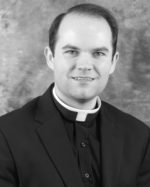 The twentieth century liturgical theologian, Romano Guardini, devoted the fifth chapter of his famous “Spirit of the Liturgy” to discuss the seeming lack of purpose in the liturgy. He raises a series of important questions which are at the heart of why so many people find the “extravagance” of the liturgy a form of useless pageantry. Why is it necessary, for example, that a Church be richly decorated or that a priest wear vestments?
The twentieth century liturgical theologian, Romano Guardini, devoted the fifth chapter of his famous “Spirit of the Liturgy” to discuss the seeming lack of purpose in the liturgy. He raises a series of important questions which are at the heart of why so many people find the “extravagance” of the liturgy a form of useless pageantry. Why is it necessary, for example, that a Church be richly decorated or that a priest wear vestments?
In a few days many couples will celebrate Valentine’s Day during which they will engage in many other “meaningless” acts. Gifts will be given of jewelry or flowers. Others will go see a movie, or share a more extravagant meal than they normally eat. Children will give their classmates candy or homemade cards.
All of these acts have no real purpose if divorced from love. The lover, however, does not focus on the “pointless” nature of his acts, but on what these gifts mean as an expression of love. In some cases these gifts may even be regarded by the sacrifice they require, either in time or in money.
The liturgy is our expression of love for God. We could offer the Eucharistic sacrifice by merely recalling the words of Christ at the Last Supper, but our prayers and sacrifice are sweetened by the actions of the liturgy. We build giant stadiums to enjoy our favorite sports and even pay exorbitant amounts of money to put granite countertops in our bathrooms, yet we question the necessity of some of the gestures of the liturgy.
When the sinful woman poured perfume over our Lord’s feet, Judas asked, “Why wasn’t this perfume sold and the money given to the poor?” (John 12:5). There are some things we do for those we love which oftentimes may not make sense to other people. Why, for example, is it necessary that the “happy birthday” song be sung? Could it not simply be spoken and its purpose still be accomplished?
The monks at Clear Creek Abbey in Oklahoma are constructing a massive Church for their small community. I noticed in this church a very large and empty space between the altar and the monastic choir. The guest master explained to me, “This place is for Gospel processions.” If we truly believe that Christ is alive in the words of Holy Scripture, why shouldn’t we make space to provide for a procession to celebrate his presence?
Ancient Jewish scholars tell us that during the time of Passover, a veritable river of blood flowed from the side of the Temple in Jerusalem due to the sheer number of lambs being sacrificed. God commanded Moses that a bull was to be offered each day for a week when Aaron and his sons were ordained. God made these “pointless” acts rich in meaning for his chosen people. And, in the fullness of time, God sacrificed his only Son so that his creatures could become holy. What better example could be found of a seemingly-useless act done in the name of love?
Perhaps the reason we find our liturgical practice lackluster today is because we do not give it a chance to fully express our love for God. Instead, we focus on how to make the Mass shorter or the building less expensive. Yes, not all communities can afford large churches, have the number of servers to produce grand processions or choirs to sing difficult choral works — but our worship must be an expression of the true love and devotion we have for God, which does not imply rich ornamentation, but means that it should be a real sacrifice of our time, talent and sometimes even our money.
One of my professors once questioned why so many people build churches out of concrete. “The homeless sleep under concrete bridges. When they step into a beautiful church they are able to enjoy its beauty as an equal with even the richest person there. Because, both are home in their Father’s house.” We should not ignore the poor by demanding ostentation in churches, yet, our service to one another must flow from the outpouring of our love for God.
Dorothy Day — a hero of the American Catholic social movement — insisted that the poor who lived in her house recite daily prayers from the Liturgy of the Hours. If we want to actively live our faith, we must fully participate in our worship, which, I would suggest, is why “active participation in the liturgy” was a primary goal of the Second Vatican Council.
This goal can be better fulfilled on an individual and a parish level by a deepening engagement in the liturgy — by preparing beforehand, being willing to sacrifice our time, and refusing to cut corners in the worship of God.
One thing we could all do is strive to make Sunday truly the day of the Lord by spending time with our family and, most importantly, in prayer. It isn’t enough for a husband to tell his wife that he loves her. He must act. And, so too must we act to demonstrate our love to God.
Guardini says, “When the liturgy is rightly regarded, it cannot be said to have a purpose, because it does not exist for the sake of humanity, but for the sake of God…man is no longer concerned with himself.”
(Aaron Williams is a third-year theologian studying to become a priest in our diocese. He and his classmate, Nick Adam, will be ordained to the transitional diaconate in mid-March.)
90-year old sister not slowing down, teaching the faith
By Joe Lee
At the time Sister Michele Doyle grew up in metropolitan Chicago, it was possible for young Catholic ladies to join a sisterhood after eighth grade and begin a lifelong commitment to faith and religious life.
Now 90 years young, and having spent more than five decades in Mississippi as a Catholic schoolteacher, college professor and parish religious education leader, she’s grateful to her parents for holding firm when they thought she was a bit young to begin chasing her dreams.
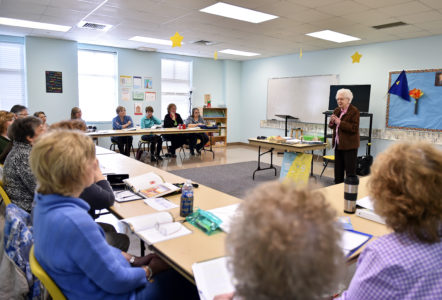
Sister Michelle Doyle talks about dealing with loss during a Catholic religion class Wednesday at St. Francis of Assisi Catholic Church in Madison.
“From the time I was a small child, I knew I wanted to be a (religious) sister,” Doyle said. “All during elementary school and high school, I continued with that desire. My parents were wise, because at that time religious communities were taking people out of eighth grade. I would do a little tantrum because I wanted to go, and they would say, ‘No, not until you finish high school.’”
After graduating in LaGrange, Illinois, Doyle entered School Sisters of St. Francis in Milwaukee, Wisconsin. That year she and her fellow sisters took the first in a series of vows which, over a period of several years, led to a lifetime vow the women were asked to make.
“We call ourselves sisters,” Doyle said. “Nuns are formally cloistered. Sisters are active (in the local community). For a long time we were trying to live both lives: the active life and the prayer life. And we still pray, of course. But today we understand that you can’t be a fully contemplative community and at the same time be an active community.”
Doyle asked to be sent to China once she was ready for active life, but when the assignment from the mother house came in 1949, she was told she was being sent to Mississippi.
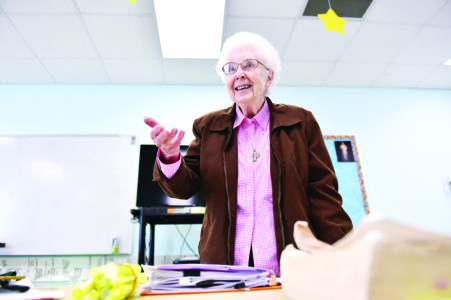
Sister Michelle Doyle leads a Catholic religion class Wednesday at St. Francis of Assisi Catholic Church in Madison.
“I was in Yazoo City for 20 years at St. Francis, an all-black mission school. I taught and was principal part of the time,” Doyle said. “The purpose in sending sisters down was in response to a request from Bishop (Oliver) Gerow, because this was a period of strong segregation — we were asked to go and not so much convert people, but the ultimate goal was to educate the African American students to help them move forward in the world.”
Doyle joined the faculty of St. Joseph Catholic School in 1969, the year St. Francis of Yazoo City closed its doors. St. Joe, now on Mississippi 463 in Madison, was located on Boling Street in West Jackson then.
“It was the year the schools were integrating, and I thought I still had something to give to the African American community,” Doyle said. “So I taught at St. Joe part time and taught history at Jackson State University part time.
“I did that seven years — I’d gotten a master’s in history from the University of Loyola in Chicago and a master’s in religious education from the University of St. Thomas in Houston, so by then I was free to move into the Jackson diocesan office in the areas of RCIA (Rite of Christian Initiation of Adults) and Adult Formation.”
Those areas of study — which involve, respectively, bringing new Catholics into the church and getting parish catechists (teaching candidates) certified — are crucial in rural parishes that may not have anyone on staff who is trained in religious education.
Although Doyle retired from full-time work in 2005, she remains very active in Adult Formation today. She continues to work closely with Holy Family of Jackson, St. Mary of Yazoo City, St. Thomas of Lexington and St. Francis of Assisi in Madison, and she’s teaching small groups of catechists right now at St. Mary and Holy Family.
Joyce Adams coordinates Adult Faith Formation at Holy Family and is also working toward certification while enjoying the series Doyle is currently teaching, “Mary and the Saints: Companions On the Journey.” It’s one of eight different classes Doyle has taught at the parish.
“Sister Michele is very meticulous,” Adams said. “She ensures that we get a minimum of 16 hours of instruction with each class. Discussions often include ways that the content has impacted one’s personal spiritual journey. Seeing the sunrise, visiting the zoo and hearing the sounds of children playing took on new meaning for me after taking the ‘Christian Prayer and Spirituality’ class.”
“Sister Michele taught me religion in 1976 (at St. Joe),” said Mary McDonald, part of the Adult Formation class at St. Francis of Assisi. “I always thought she was a wonderful teacher, and she was always very dedicated to her profession. It was so clear even to a high school student that she not only talked about service to others, but she lived it.”
“I think there is something extraordinary about a person who does not see age as a limitation to maintain a sense of purpose,” said Fran Lavelle, director of the department of faith formation with the Catholic Diocese of Jackson. “She is a great inspiration to me as I think about all of the years she has served God’s people. She could sit back and enjoy the fruits of her labor. But, for Sister Michele, the fruits are her labor.”
Diane Melton, religious education coordinator and a St. Mary’s parishioner in Yazoo City, took catechist Level II classes from Doyle in 2009 and became certified to teach adults at her parish. Doyle is currently teaching “Christology: Jesus of the Gospels and History” at St. Mary’s through the end of February.
“She has a way of making things relevant to our day and time as well,” Melton said. “Several of us have taken some of her classes the second time because she is so easy to listen to, and just to gain more information regarding our Catholic faith.”
It has been a full 75 years since the eighth grade sister-to-be was itching to leave home and serve. And as her students see each day, Doyle shows no signs of slowing down.
“I enjoy what I’m doing. It’s an opportunity to be with people and be creative,” Doyle said. “And to share the gifts I have — everyone has gifts. I don’t garden and I don’t cook and I don’t sew, so I do what I can do. People keep coming back.”
(Reprinted with permission from the Clarion Ledger.)
Chanche Medal, youth award, recall work of pioneer bishop
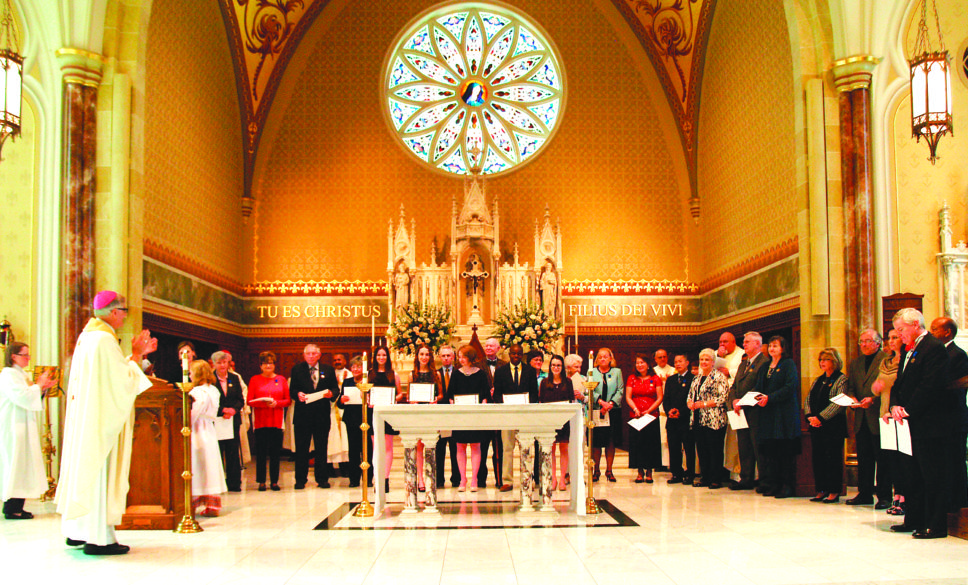
Bishop Kopacz leads the applause for the recipients of the Bishop Chanche Medal and youth awards for service for 2017. The awards were given out during a Mass at the Cathedral of St. Peter the Apostle on Saturday, Feb. 18. (Photo by Maureen Smith)
Every February the Diocese of Jackson bestows the Chanche Medal for service upon individuals, nominated by their parishes, who have given extraordinary service to their communities. This year the celebration was Saturday, February 18 at 1:30 p.m. in the Cathedral of St. Peter the Apostle. What follows are excerpts from the nominations for all of this year’s honorees.
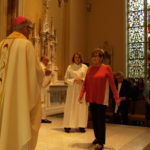
Rebecca Bellipanni from McComb, St. Alphonsus
REBECCA BELLIPANNI – McComb St. Alphonsus
Cleans and maintains sanctuary, operated first integrated daycare in McComb using parish facility, lay ministries.
“Many times Protestants have told me how much the St. Alphonsus daycare meant to their family. Their children’s’ success in school, college and career would be traced to the early learning and moral foundation Becky Bellipanni provided for them,” Father Brian Kaskie, pastor.
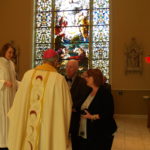
Richard Butler from Natchez, Assumption
RICHARD BUTLER – Natchez Assumption of the Blessed Virgin Mary
Volunteer music director.
“His service has meant that a small parish, Assumption in Natchez, has had a music program for every Sunday, during Advent and Christmas times and for Lent, Holy Week and Easter,” Father David O’Connor, pastor.
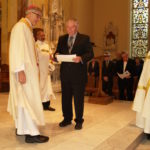
Tony Dardeau from Vicksburg, St.-Michael
TONY DARDEAU – Vicksburg St. Michael
Sacristan, usher, lector, replaces misselettes and sanctuary/tabernacle candles.
“While commitment to his individual ministries may seem small and unassuming, the totality of Tony’s ministerial work is amazing. He is a wonderful example of someone living out their baptismal promises.” Father P.J. Curley, pastor.
JOHN DAVIS – Chatawa St. Teresa of Avila
Pastoral council, usher, lay ministries.
“Since the parish in Chatawa is full of older, retired people, including John, he is always available to help in any way. He feels responsible for fulfilling his responsibilities even though he is a volunteer,” Father Suresh Thirumalareddy, pastor.
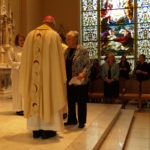
Aulene Flaccomio from Woodville, St. Joseph
AULENE FLACCOMIO – Woodville St. Joseph
Sacristan, bereavement committee, volunteer.
“In spite of some health issues, Aulene faithfully carried out her sacristan duties. Her ministry is a powerful witness to the gospel of stewardship,” Father Scott Dugas, pastor.
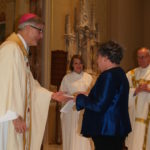
Margaret Griffin, from Batesville, St. Mary
MARGARET JUNE GRIFFIN – Batesville St. Mary
Altar Society and flower guild, Cursillo, ministry to homebound, music and liturgical ministries.
“June is a true evangelizer – in her family, her parish family and in the civic organizations to which she belongs. She the THE faith leader in her family and an extremely dedicated lay minister in the parish,” Father Sam Messina, pastor.
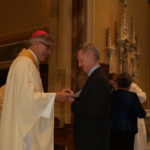
Gene Loper from Jackson, St. Peter
GENE LOPER – Jackson St. Peter the Apostle.Doctor for priests, religious and Madison St. Joseph athletic teams. Supports development efforts at Madison St. Joseph School.“His special ministry is Catholic education. I do not believe we would have St. Joseph High School today without the sacrifices in time and energy he has made for that school.” Msgr. Michael Flannery, cannonical steward for St. Joseph School.
AGNES McCRAINE – Gloster Holy Family (mission)
Community advocate for social justice, bereavement committee member, community leader.
“Miss. Agnes’ ecumenical outreach in helping and encouraging others through prayer services for social justice causes, bettering her Centerville community, helping nurture prayer sessions on poverty, crime and quality of life for more than 30 years speaks volumes about her commitment to church and community,” Father Scott Dugas, pastor.
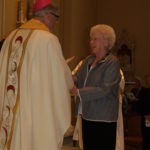
Ruth McWilliams from Natchez, St. Mary Basilica
RUTH McWILLIAMS – Natchez St. Mary Basilica
Liturgical planning, youth program, volunteer.
“She was a staff member during a creative period for this parish – helping plan and open a new family life center, while many new programs were being developed and a time of increased parishioner participation. Her role was to take new ideas at their beginning and develop them into programs, recruiting chairpersons and participants,” Father David O’Connor, pastor.
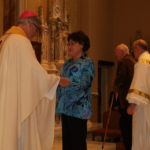
Clara Mandolini from Greenville, St. Joseph
CLARA MANDOLINI – Greenville St. Joseph
Catechist, RCIA team, bereavement ministry, Discovering Christ leader.
“Clara’s volunteer work requires significant time in training and teaching so she is at church instead of at home. She currently travels to Jackson for training in Catechesis of the Good Shepherd,” Father Bill Henry, pastor.
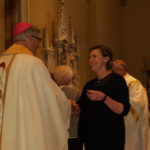
Emily Moran from Philadelphia, Holy Cross
EMILY MORAN –Philadelphia Holy Cross
Youth ministry, parish council, liturgical ministries.
When the previous pastor died “the church was without a priest for almost a year. During those months, she played an important role in the church and the religious education of the children. Because of her commitment and dedication, we have a good number of children fro the CCD and have good programs for them,” Father Augustine Palimattam, pastor.
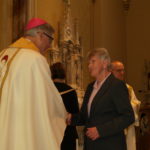
Gloria Morarity from Olive Branch Queen of Peace
GLORIA MORARITY – Olive Branch Queen of Peace
Catechist, youth group leader, church landscaper, liturgical ministries.
“The one thing that stands out about Gloria is her quiet, positive and humble ways. She is quick to encourage all parishioners with a pat on the back and a reminder that God is with all of us,” Father Thi Pham, SCJ, pastor.
ROBERT NEWELL– Jackson St. Peter the Apostle
Finance council, ministry to elderly, lay ministries
“Bob Newell was an incredible man who brought great humor, joy and love to all relationships. He was the glue that held us all together at the cathedral. His Catholic faith guided him throughout his life in every situation, good and not-so-good,” Father Anthony Quyet, pastor.
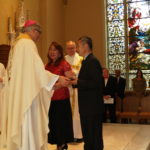
John Pham and Thuy Nguyen from Forest, St. Michael
JOHN PHAM AND THUI NGUYEN – Forest St. Michael the Archangel Ministry to Vietnamese community, liturgical ministries, upkeep of parish facilities.
“The Vietnamese population continues to grow. While some are moving away… St. Michael remains the site for big celebrations such as Tet and the New Moon Festival. They are always involved in those celebrations both in preparation and cleanup,” Father Joseph Dyer, pastor.
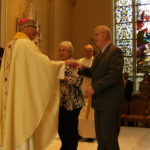
Arnie and Lois Senger from Clinton, Holy-Savior
ARNIE AND LOIS SENGER – Clinton Holy Savior
Directors for diocesan Engaged Encounter ministry, parish repair work, bookkeeping, lay ministry.
“Working with Engaged Encounter has made a difference for hundreds of couples preparing for marriage in the diocese. Arnie saves us money by working on parish buildings and Lois by working on the books,” Father Tom McGing, pastor.
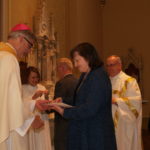
Judy Strong from Gluckstadt, St.Joseph
JUDY STRONG – Gluckstadt St. Joseph
Lay ministries, bereavement committee coordinator, flower guild coordinator, Knights of Columbus auxiliary.
“Judy’s service provides me with calm assurance that whatever I need done, she can be counted on to take care of it. Her calm, quiet dedication is a testament to the faith she lives out every day,” Pam Minninger, pastor.
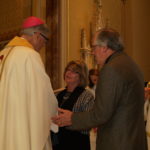
proxy for Jane Sullivan from Tupelo, St.James
JANE SULLIVAN – Tupelo St. James
Ministry to sick and homebound. liturgical ministries.
“Jane has been an inspiration to so many. Not only does she touch the lives of those she visits and their families, she is an inspiration to our parishioners who see her ministry and witness her quiet, humble presence,” Father Lincoln Dall, pastor.
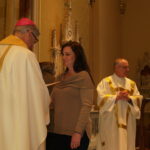
Shannon Trautman from Amory, St.-Helen
SHANNON TRAUTMAN – Amory St. Helen
Youth ministry, Meals-on-Wheels, food pantry work, liturgical ministries.
“Without Shannon and another woman, the youth and children’s programs would not exist. The community of Amory is also deeply indebted to this family. The Food pantry, meals on wheels, the school system and Amory Downtown are all aware of who they are and the good they do with humility and grace,” Sr. Lael Niblick, pastor.
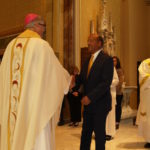
Ossie Whittington from Jackson, Holy Family
OSSIE WHITTINGTON – Jackson Holy Family
Men’s club, hospitality ministry, physical plant upkeep and repair.
“Mister Whittington took off work to be present during the building of the new parish hall, the demolition of the old building and to take care of ‘little things’ as needed by the pastor … He has been one of the consistent persons who would readily respond when needed,” Father Xavier Armirtham, pastor.
DAVID AND WENDY WHITTINGTON – Magnolia St. James (mission)
Lay ministries, pastoral council, finance council, overall volunteers.
“This couple is so prayerful. They are a very good inspiration to younger couples in our parish. Many people in our parish admire them for their ministry, service and sacrifice,” Father Suresh Thirumalareddy, pastor.
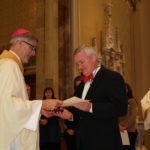
Wes Williams from Madison, St. Francis
H. WESLEY WILLIAMS, III – Madison St. Francis of Assisi
Coordinator for ChristLife program, Knights of Columbus, Habitat for Humanity, Boy Scouts, capital campaign committee, catechist, lay ministries, finance council.
“This past year, Wes has made it a priority to help the parish grow as a community by promoting the mission of the parish, helping build community and helping form disciples among the parishioners at St. Francis.” Father Albeenreddy Vatti, pastor.
YOUTH
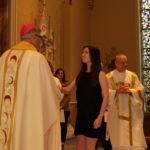
Tori Ann Cobb from Gluckstadt, St. Joseph, Chanche youth award.
TORI ANN COBB – Gluckstadt St. Joseph
SEARCH retreat leader, CYO, youth choir, liturgical ministries, mentor and tutor, service club
“Tori sets an example of how to behave as a proud member of the church and her community. I feel like she has challenged me to be a better youth minister to all I serve.”
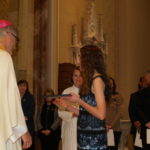
Caroline Doherty from Jackson, St. Richard, youth award
CAROLINE GRACE DOHERTY – Jackson St. Richard
SEARCH retreat leader, CYO, CORE team, Madison St. Joseph High School Cross Country team captain, president Mu Alpha Theta math club, Madison Mayor’s youth council.
“Because of her maturity, Caroline has built a heart of kindness to serve others while responsibly balancing her academic affairs, extracurricular activities and faith life. Overall, Caroline is a witness of word and service to others in her actions, words and deeds.”
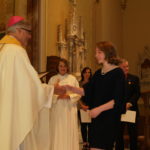
Helen Greene from Canton, Sacred Heart, Chanche youth award
HELEN M. GREENE –Canton Sacred Heart
Alive in You service camp, youth choir, nursing home volunteer.
“Helen is mature, responsible and compassionate. She goes out of her way to welcome newcomers and be am ambassador for her faith.”
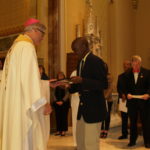
Rodney Self from Jackson, Holy Family, Chanche youth award
GERALD SELF, Jr. – Jackson Holy Family .
Liturgical ministries, CYO, volunteer activities, Alive in Youth service camp.
“His integrity is impeccable. He quietly goes about doing his tasks s with little fanfare, but demonstrates that he has a strong moral compass and is willing to help others.”
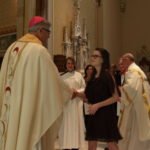
Laurie Richard from McComb, St. Alphonsus, Chanche youth award
LAURIE RICHARD – McComb St. Alphonsus
CYO, music ministry, crisis pregnancy volunteer, ministry to homebound.
“Laurie has a deep devotion to prayer and a love for evangelization. Everyone feels welcome in her presence and she tactfully challenges other youth to live out their own faith.”
31st Habitat for Humanity Catholic Build house dedicated
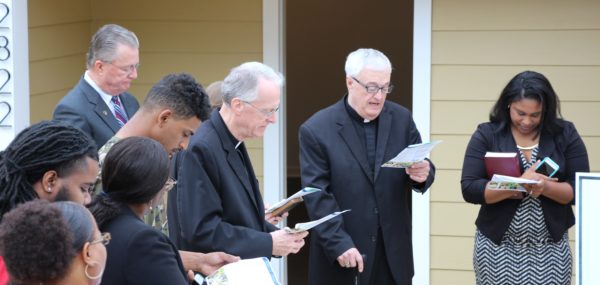
Msgr. Elvin Sunds, pastor of Jackson St. Therese Parish prays as Bishop Emeritus Joseph Latino blesses the new Habitat Home on Greenview Dr. in Jackson.
By Peggy Hampton
JACKSON – Ariel and Christopher Jones of Jackson and their three children now have a safe, decent, affordable home and a brighter future, thanks to a partnership of Catholic parishes in the metro Jackson area.
The 31st Habitat for Humanity Catholic Build home was dedicated Wednesday, January 25. Bishop Emeritus Joseph Latino blessed the new home and homeowners. Partner churches included Flowood St. Paul; Madison St. Francis of Assisi; Clinton Holy Savior; Gluckstadt St. Joseph and Jackson’s St. Therese, St. Richard, Christ the King and the Cathedral of St. Peter the Apostle; along with St. Dominic’s Health Services and the Catholic Diocese of Jackson.
Volunteers from the partnership worked eight Saturdays in October and November to build the house. The homeowner couple worked along with volunteers, building not only a house but a bond with the partner members.
“The Catholic Build volunteers are the most loving people I have ever met,” Ariel said. “I have enjoyed meeting and getting to know each and every one of them.
“This was a great Habitat build,” added Christopher. “From the bottom of our hearts, we appreciate it, and we thank you.”
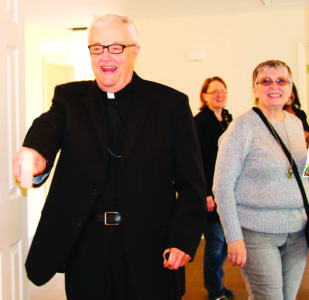
JACKSON – Bishop Emeritus Joseph Latino blessed every room of the newest Habitat for Humanity Home on Greenview Drive in South Jackson on Wednesday, Jan., 25. At left, volunteers, area pastors and sponsors gathered for the dedication and blessing. This is the 31st home built as part of Catholic Build. (Photos by Peggy Hampton)
The house was built on Greenview Drive in south Jackson, a street that the Catholic community has played a major role in transforming through its partnership with Habitat. The first two new houses built on the street were the Pope Francis House and the 2015 Catholic Build home, and now the recently dedicated Catholic Build home. The street is located immediately west of St. Therese Parish, and the families who occupy these homes are neighbors.
The partnership will begin plans soon on the 32nd Catholic Build Habitat home – this one also to be constructed on Greenview Drive.
For more information about how to become a Habitat volunteer, donor, or homeowner, please call 601-353-6060 or visit www.habitatmca.org.
(Peggy Hampton is the public relations, marketing and fundraising coordinator for Habitat for Humanity Mississippi Capital Area.)

Homeowner Ariel Jones stands in front of her new home with her baby.
Sacred Heart Southern Missions breaks ground on volunteer house
By Laura Grisham
HOLLY SPRINGS – Wednesday, Jan. 25, will be remembered as an important day for Sacred Heart Southern Missions (SHSM) and Northwest Mississippi. It was on this day that the groundbreaking for the Father Gregory Bezy Volunteer House in Holly Springs took place. Bishop Joseph Kopacz, bishop of the Diocese of Jackson, and Holly Springs Mayor Kelvin Buck were among those participating in the ceremony, which had originally been planned for earlier in the month, but was rescheduled due to ice and snow.
The Father Gregory Bezy Volunteer House will play an important role by housing caring people who travel to northeast Mississippi from near and far to help others.
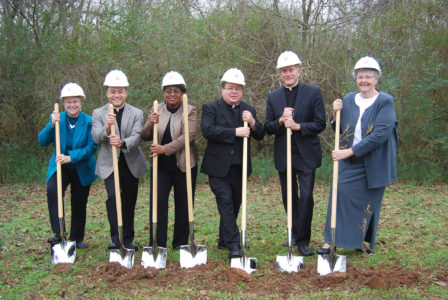
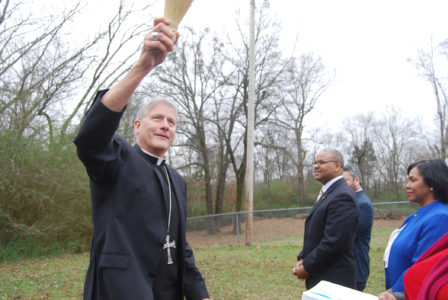
HOLLY SPRINGS – Bishop Joseph Kopacz blesses the site of what will become a volunteer house in Holly Springs for groups who come to work with Sacred Heart Southern Missions. (Photo by Laura Grisham)
Each year, Sacred Heart Southern Missions hosts hundreds of volunteers from all across the country. Last year, that total exceeded 1,400 people, many of them high school and college students wanting to make a difference in the lives of the poor.
They offer a variety of service, everything from manual labor to works of mercy. Projects include work in home repair, helping distribute food for the food bank, tutoring or helping with summer programs for teens and kids. Often, volunteers find that those whom they have helped have made a difference in their lives as well.
“In volunteering, they find that they, too, have been changed,” said Father Jack Kurps, SHSM executive director. “Their hearts have been changed by their experience. They learn what it means to be a Christian.”
The new facility will have the space to house 32 volunteers. Project completion is expected by fall. It is named after Father Gregory Bezy, SCJ, who came to Mississippi in 1952 and served as the director for Sacred Heart Southern Missions for more than 30 years. Father Bezy was instrumental in establishing several churches here in northern Mississippi, expanding schools, and initiating many of our social outreach programs.
“He touched the lives of many in Mississippi and across the nation,” said Father Krups.
The advent of this new facility will provide much needed accommodations for our ever-increasing volunteer base. It will also afford us the opportunity to complete more projects for those in need through the additional sets of willing hands.
(Story reprinted with permission from Sacred Heart Southern Missions’ newsletter.)
Pope: Dream, prophesy, don’t focus just on survival
By Cindy Wooden
VATICAN CITY (CNS) – When religious orders focus on survival rather than on sharing the joy and hope of faith in Jesus, they end up being “professionals of the sacred, but not fathers and mothers,” Pope Francis said.
“The temptation of survival turns what the Lord presents as an opportunity for mission into something dangerous, threatening, potentially disastrous,” the pope told consecrated men and women who joined him Feb. 2 for Mass on the feast of the Presentation of the Lord and the World Day for Consecrated Life.
Speaking as a fellow member of a religious order, Pope Francis urged religious to keep alive the faith, hope and audacity of the men and women who founded the orders to which they belong.
“We are heirs to those who have gone before us and had the courage to dream,” he said during the Mass, which began with the blessing of candles celebrating the presentation of Christ as the light of the world.
The feast day Gospel reading from St. Luke tells the story of Mary and Joseph bringing the newborn Jesus to the temple in fulfillment of the law. The elderly and pious Simeon and Anna are in the temple and rejoice when they see Jesus, recognizing him as the Messiah.
Simeon and Anna, the pope said, testified that “life is worth living in hope because the Lord keeps his promise.”
The pope said religious have inherited Simeon and Anna’s hymn of hope from their founders and elders, who “had the courage to dream.”
Hope in the Lord and the prophetic announcement of his presence “will protect us from a temptation that can make our consecrated life barren: the temptation of survival” and of preserving institutions above all else, said the pope, a member of the Jesuit order.
“The mentality of survival makes us reactionaries, fearful, slowly and silently shutting ourselves up in our houses and in our own preconceived notions,” he said. “It makes us look back to the glory days – days that are past – and rather than rekindling the prophetic creativity born of our founders’ dreams, it looks for shortcuts in order to evade the challenges knocking on our doors today.
“A survival mentality robs our charisms of power, because it leads us to ‘domesticate’ them, to make them ‘user-friendly,’ robbing them of their original creative force,” Pope Francis continued. “It makes us want to protect spaces, buildings and structures, rather than to encourage new initiatives.”
The temptation of survival, he said, “turns us into professionals of the sacred but not fathers and mothers, brothers and sisters of that hope to which we are called to bear prophetic witness.”
Like Mary and Joseph, religious are called to bring Jesus into the midst of his people, the pope said. “Only this will make our lives fruitful and keep our hearts alive.”
All Christians, but especially those consecrated with the vows of poverty, chastity and obedience, are called to be the leaven of the Gospel in the world, he said.
“Perhaps there are better brands of flour, but the Lord has called us to be leaven here and now, with the challenges we face. Not on the defensive or motivated by fear,” he said, “but with our hands on the plow, helping the wheat to grow, even though it has frequently been sown among weeds.”
“Putting Jesus in the midst of his people,” he said, “means taking up and carrying the crosses of our brothers and sisters. It means wanting to touch the wounds of Jesus in the wounds of a world in pain, which longs and cries out for healing.”
Welcoming the Stranger
IN EXILE
By Father Ron Rolheiser, OMI
In the Hebrew Scriptures, that part of the bible we call the Old Testament, we find a strong religious challenge to always welcome the stranger, the foreigner. This was emphasized for two reasons: First, because the Jewish people themselves had once been foreigners and immigrants. Their scriptures kept reminding them not to forget that. Second, they believed that God’s revelation, most often, comes to us through the stranger, in what’s foreign to us. That belief was integral to their faith.
The great prophets developed this much further. They taught that God favors the poor preferentially and that consequently we will be judged, judged religiously, by how we treat the poor. The prophets coined this mantra (still worth memorizing): The quality of your faith will be judged by the quality of justice in the land; and the quality of justice in the land will always be judged by how orphans, widows, and strangers fare while you are alive.
Orphans, widows, and strangers! That’s scriptural code for who, at any given time, are the three most vulnerable groups in society. And the prophets’ message didn’t go down easy. Rather it was a religious affront to many of the pious at the time who strongly believed that we will be judged religiously and morally by the rigor and strictness of our religious observance. Then, like now, social justice was often religiously marginalized.
But Jesus sides with the Hebrew prophets. For him, God not only makes a preferential option for the poor, but God is in the poor. How we treat the poor is how we treat God. Moreover the prophets’ mantra, that we will be judged religiously by how we treat the poor, is given a normative expression in Jesus’ discourse on the final judgment in the Gospel of Matthew, Chapter 25. We are all familiar, perhaps too familiar, with that text. Jesus, in effect, was answering a question: What will the last judgment be like? What will be the test? How will we be judged?
His answer is stunning and, taken baldly, is perhaps the most challenging text in the Gospels. He tells us that we will be judged, seemingly solely, on the basis of how we treated the poor, that is, on how we have treated the most vulnerable among us. Moreover at one point, he singles out “the stranger”, the foreigner, the refugee: “I was a stranger and you made me welcome … or … you never made me welcome.” We end up on the right or wrong side of God on the basis of how we treat the stranger.
What also needs to be highlighted in this text about the last judgment is that neither group, those who got it right and those who got it wrong, knew what they were doing. Both initially protest: the first by saying: “We didn’t know it was you we were serving” and the second by saying: “Had we known it was you we would have responded.” Both protests, it would seem, are beside the point. In Matthew’s Gospel, mature discipleship doesn’t depend upon us believing that we have it right, it depends only upon us doing it right.
These scriptural principles, I believe, are very apropos today in the face of the refugee and immigrant issues we are facing in the Western world. Today, without doubt, we are facing the biggest humanitarian crisis since the end of the Second World War. Millions upon millions of people, under unjust persecution and the threat of death, are being driven from their homes and homelands with no place to go and no country or community to receive them. As Christians we may not turn our backs on them or turn them away. If Jesus is to be believed, we will be judged religiously more by how we treat refugees than by whether or not we are going to church. When we stand before God in judgment and say in protest: “When did I see you a stranger and not welcome you?” Our generation is likely to hear: “I was a Syrian refugee, and you did not welcome me.”
This, no doubt, might sound naïve, over-idealistic, and fundamentalist. The issue of refugees and immigrants is both highly sensitive and very complex. Countries have borders that need to be respected and defended, just as its citizens have a right to be protected. Admittedly, there are very real political, social, economic, and security issues that have to be addressed. But, as we, our churches, and our governments, address them we must remain clear on what the scriptures, Jesus, and the social teachings of the church uncompromisingly teach: We are to welcome the stranger, irrespective of inconvenience and even if there are some dangers.
For all sorts of pragmatic reasons, political, social, economic, and security, we can perhaps justify not welcoming the stranger; but we can never justify this on Christian grounds. Not welcoming stranger is antithetical to the very heart of Jesus’ message and makes us too-easily forget that we too once were the outsider.
Oblate Father Ron Rolheiser, theologian, teacher, and award-winning author, is President of the Oblate School of Theology in San Antonio, TX. He can be contacted through his website www.ronrolheiser.com.
Now on Facebook www.facebook.com/ronrolheiser
Louisiana Bishop Herzog retires; Coadjutor Bishop Talley succeeds him
By Catholic News Service
WASHINGTON (CNS) – Pope Francis has accepted the resignation of Bishop Ronald P. Herzog of Alexandria, Louisiana. Coadjutor Bishop David P. Talley of Alexandria succeeds him.
The changes were announced in Washington Feb. 2 by Archbishop Christopher Pierre, apostolic nuncio to the United States.
Bishop Herzog, 74, had headed the 11,108-square-mile diocese in central Louisiana since 2005. Bishop Talley, 66, was named coadjutor of the diocese by Pope Francis last September.
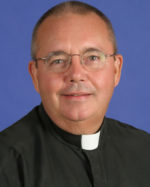
Coadjutor Bishop David P. Talley of Alexandria, La., 66, pictured in a 2010 photo, will succeed Bishop Ronald P. Herzog of Alexandria after Pope Francis accepted the Feb. 2 resignation of Bishop Herzog, who is 74. (CNS photo/Michael Alexander, Georgia Bulletin) See LOUISIANA-BISHOPS Feb. 2, 2017.
When he was appointed coadjutor, Bishop Talley was an auxiliary bishop of the Atlanta Archdiocese, where he was vicar general and director of priest personnel. He was ordained a priest of the archdiocese in 1989.
He became the first native-born Georgian to serve as a bishop in the archdiocese. His episcopal motto is “He will give you a new heart.”
As a priest, he served the archdiocese in several capacities, including as director of vocations, tribunal judge, judicial vicar and chancellor. He also served on the Atlanta Archdiocese’s Hispanic ministry board.
When he was director of vocations, the archdiocese initiated a cross-cultural immersion program for seminarians where they spent time living in El Paso, Texas, and in Juarez, Mexico, to learn Spanish and be more knowledgeable about Hispanic culture and more skilled at ministering in a variety of communities.
One of his roles in the Atlanta Archdiocese was as chaplain to the disabilities ministry. He has said that his experience ministering among people with disabilities, which began at his first parish assignment, is key to his spiritual life.
“All they can do is ask the Lord for help. That simplicity and humility is where I think the church should be – humble before God,” he said in an interview in 2013.
Bishop Talley was raised as a Southern Baptist but has said he left the church as a teenager over the issue of racial segregation. At Auburn University, he met Catholics and read the writings of Trappist Father Thomas Merton, which led him to become a Catholic, he said. He was 24 when he joined the church at St. Mary Church in Opelika, Alabama.
Family members remain faithful Baptists, including a brother who is a deacon. That background gives him a broad view, he said. “I do know faith across the spectrum,” he said.
Born in Columbus, Georgia, Sept. 11, 1950, he pursued seminary studies at St. Meinrad Seminary and School of Theology in Indiana, earning a master of divinity degree. He was ordained a priest for the Atlanta Archdiocese June 3, 1989, at the Cathedral of Christ the King in Atlanta by Archbishop Eugene A. Marino.
His first assignment was as parochial vicar of St. Jude Parish in Sandy Springs, Georgia. He was there until 1993, when he began post-graduate studies at the Pontifical Gregorian University in Rome, where he earned a doctorate in canon law in 1998. In 2001, Pope John Paul II named him a monsignor.
He served other parishes as administrator, pastor and parochial vicar. He last assignment before being named an auxiliary bishop was as pastor of St. Brigid Parish in Johns Creek, Georgia, from 2011 to 2013.
Bishop Talley currently serves as chairman of the U.S. Conference of Catholic Bishops’ Subcommittee on the Catholic Campaign for Human Development, and as a member of USCCB’s Committee on National Collections and its Committee on Ecumenical and Interreligious Affairs.
Born April 22, 1942, in Akron, Ohio, young Ronald Herzog moved with his parents to Natchez, Mississippi, when he was 11 years old. After studies at St. Joseph Seminary in St. Benedict, Louisiana, and at the Pontifical College Josephinum in Worthington, Ohio, he was ordained a priest June 1, 1968, for the then-Diocese of Natchez-Jackson.
He held pastoral posts throughout his priesthood, in addition to having many diocesan responsibilities. He also became a chaplain in the Mississippi National Guard, eventually retiring with the rank of brigadier general.
He became part of the new Biloxi Diocese when it was formed in June 1977. When Bishop Herzog was named to head the Diocese of Alexandria, he became the first priest from the Biloxi Diocese to be named a bishop.
